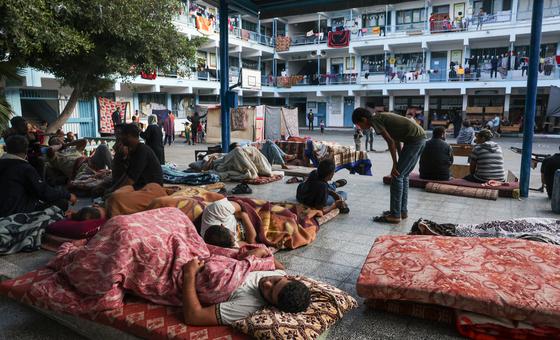Their humanitarian update opened with a moment of silence for all those who have lost their lives since the start of the conflict on 7 October, and for the 240 Israeli men, women and children still being held hostage by Hamas.
“What we’ve seen unfold over the last 26 days in Israel and in the Occupied Territories is nothing short of what I think I would call a blight on our collective conscience,” said UN Humanitarian Coordinator Martin Griffiths, fresh from the region. “All of us, we are all somehow involved in this.”
Death and displacement
Mr. Griffiths recalled that 1,400 Israelis have been killed and nearly 9,000 Palestinians, though the true number will only be known after the rubble is cleared in Gaza. The desolation there reminded him of the early days of the Syrian war “where we saw towns like Homs razed to the ground”.
More than 1.5 million people are now displaced and nearly 600,000 are crowded in shelters run by the UN agency that assists Palestine refugees, UNRWA, which has lost 72 staff members. He believed this marked the highest loss ever of UN staff in conflict.
Not enough trucks
He told ambassadors that “intense humanitarian negotiations day and night” between Israel, Egypt, the United States and the UN have produced results.
So far, 329 trucks carrying aid have entered Gaza through the Rafah crossing with Egypt, which opened on 21 October, with 100 making the journey on Thursday alone. However, he said an average of 500 truckloads were needed prior to the conflict.
“These negotiations – detailed and important as they are – don’t do the business. We are not keeping up with the progress towards desolation, which is the story of Gaza these days,” he said.
Humanitarian pauses
Mr. Griffiths reiterated the obligation to respect humanitarian law, to release all hostages unconditionally, and to protect civilians and civilian infrastructure, which also includes humanitarian workers and their facilities.
“Civilians remain entitled to protection whether they stay or move, and they have the right to choose. And anyone who doesn’t evacuate mustn’t automatically be considered to support the adversary or target of an attack,” he insisted.
He said essential supplies must also be allowed into Gaza, including humanitarian relief and fuel. Relatedly, Mr. Griffiths reported that he had received news that more fuel will be delivered to the enclave.
“These negotiations must continue but they are not enough. We must have those pauses,” he said, referring to the call for a humanitarian ceasefire. “If we do not have pauses, we will not keep up with the needs of the people of Gaza and the Israelis also caught up in those areas of conflict.”
Braving airstrikes for bread
Meanwhile, the UN Humanitarian Coordinator in the region warned that the situation will only deteriorate if hostilities continue.
Lynn Hastings, Deputy Special Coordinator for the Middle East Peace Process, said four UNRWA shelters hosting nearly 20,0000 displaced people were hit on Thursday. At least 23 people were killed, and dozens injured.
She also spoke of the desperation in Gaza, where back-up generators essential for hospitals, water desalination plants and food production facilities “are one-by-one grinding to a halt”.
The health system is also overwhelmed amid severe shortages of supplies, water, electricity and personnel. To date, 14 out of 35 hospitals and 51 of 72 primary health clinics have shut down. Only one of the three water supply lines from Israel is operational.
“Access to food is becoming increasingly a concern. People are braving airstrikes to line up outside bakeries to obtain bread, a number of which have already been closed down due to lack of fuel,” she said.
Ease the suffering
While welcoming the agreement for aid delivery through the Rafah crossing, Ms. Hastings stressed the need to pick up the pace, noting that recent deliveries did not include fuel. Furthermore, additional crossings will be needed.
She also underlined the appeal for humanitarian ceasefires, saying they “will ease the epic human suffering and make humanitarian access easier and safer.”
Next week, humanitarians will issue an updated flash appeal for the Occupied Palestinian Territory. They estimate $1.2 billion will be required to meet the needs of the entire population of Gaza and 500,000 people in the West Bank through the end of the year.

